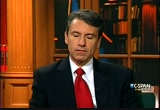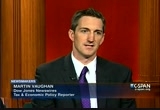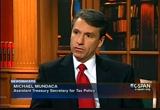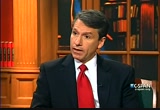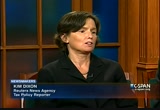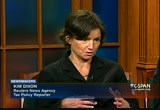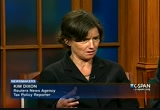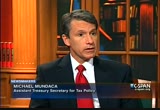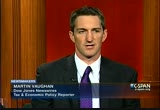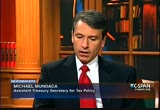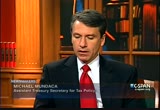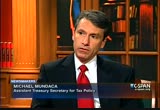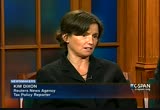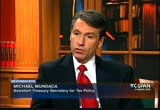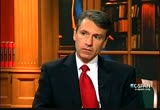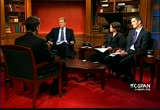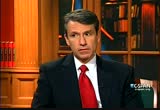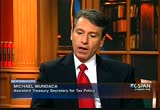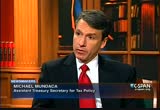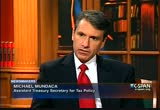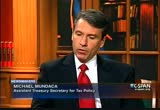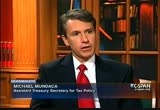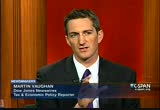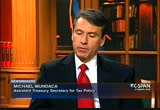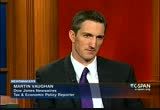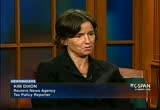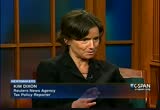tv Newsmakers CSPAN September 12, 2010 10:00am-10:30am EDT
10:00 am
gets under way 7:00 a.m. eastern time, 4:00 if you're joining us from the west coast. it is a back to workweek congress and an agenda that will be packed before members leave for the october campaign break. and colon will be joining us -- collin will be joining us. and he will be talking about efforts in iraq and negotiators in the middle east as secretary of state hillary clinton travels to the region this week. thanks for being with us on this sunday. enjoy the rest of your weekend. hope you have a great week ahead. . .
10:03 am
10:04 am
>> the first order of business when they woman back next week. we hope it gets done quickly. then they have to think about what to do on the bush tax cuts. we understand that. hopefully we'll have some agreement on both of those issues, move swiftly. then they can turn to the president's proposals just made this week. but those proposals weren't made with a specific timeframe or calendar in mind. they're good policy, good
10:05 am
proposals. if congress can't get to them in the next few weeks, they are still going to be good policy when congress returns. >> could i pick up on that, speaking of the tax cuts, that is one of the big tax items that has to be dealt with by the end of the year. former white house budget director peters or yag, you know, came out recently talking about maybe looking at some temporary extension of all the tax cuts. what would be the harm of that? >> i understand his point. he's making a political point. made it time i think that he preferred only a extension of the middle class tax cuts, not the high-end ones. we have a great team. i'll leave the political strategy to them. the president has been very clear on the policy that the sound policy is to extend only to the middle class tax cuts to
10:06 am
lock into place, provide certainty, with respect to 98% of individual small business owners who are facing attacked increase that these tax cuts are allowed to expire. again, we simply cannot afford the tax cuts on the top 2%. those should be allowed to expire as scheduled. >> could we afford to do it for one year? and if the choice is just doing it for one or two years versus some sort of deadlock in congress like what happened last year with the estate tax, is there any room for compromise, do you think? >> the president has been clear the better policy is to allow the high-end tax cuts to expire as scheduled. this talk of one year two years, we think it's a strategy for permanence. and representative boehner in announcing his support for this two-year skens also made clear
10:07 am
he would continue to fight for permanence. so, sken, we see this as a strategy for permanence. we can't afford to have to borough $700 million in order to fund the tax cuts for the top 2% of americans. they should be allowed to expire as scheduled. >> but if it's a choice between a short-term extension and gridlock and not getting anything done, it would be fairly bad for the economy to let those lower and middle income tax cuts expire. right? >> i hope we don't have to face that. there is an agreement. i hope we can coalesce around the very sound policy of doing that. >> michael mundaca, just to go back to martin vaughn's first questions about the 100% expensing, etc., and the uncertainty that business owners and capital investments are facing, doesn't this -- all of this talk of one year, two years, doesn't this add to
10:08 am
uncertainty in the tax code and thus may not be contributing positively to the economy? >> that's a great point. again, i think we have to distinguish between the uncertainty created because we can't get agreement around proposals as the uncertainty created by something else. we've viewed the targeted temporary expensing as a measure to bring forward investment. it has to be temporary. the other proposal the president made with respect to the r & d credit, that's another proposal seeking to remove the uncertainty by taking out of the mix the year-to-year exercise we have to go through to reauthorize that credit. so i take your point. but on the expensing, it is temporary for a reason. the r & e credit is temporary because of historical and political accident. that's what we need to make permanent. that's what the president is proposing, remove the uncertainty, allow businesses to plan their r & d. great jobs in the u.s. created
10:09 am
with respect to those activities, to allow businesses to know that credit will be there and not face what they are facing this year, which is the credit is not there right now. it expired in 2009. we have to act to extend it to 2010. the president wants to take us off that path and make this permanent. >> next question. maybe just to go back to the bush tax cuts and the policy on that. one of the questions is, how do you define middle class? and the president had, in the past, defined that as threshold of $200,000 or less or for married couples, $250,000 or less. some democrats on the hill think that's too low. particularly in urban centers where someone's definition of the middle class might well be broader than a family making $250,000 a year. are you rethinking that at all or is the administration considering, you know, supporting raising that to $500,000 or even a million? >> again, the president's been clear in setting those
10:10 am
thresholds at $200,000, $250,000, as you note, for extending the tax cuts. it covers 98% of americans. so i think it's a sound definition of what's middle class. people can actually come the other way back on us and say, how is it that 98% of americans are middle class or below but the president has been clear that's where we think the tax relief should be delivered. it's based on a number of different factors and analysis, as the president has laid out, as secretary geithner has spoken about. there was a period of time recently in which the middle class -- again, defining up to $200,000, $250,000 -- did not see their income increased near the level it in the past and near the level it was increasing for the highest earners in the united states. we need to lock in the tax cuts for, again, 98% of americans and allow the tax cuts on the top 2% to expire as scheduled. >> isn't that threshold pretty
10:11 am
arbitrary? the difference between a family living in philadelphia and making $280,000 a year and someone, you know, living in, you know, rural missouri or something like that at a $230,000 income, the standard of living, you know, it's not all about the income that you make. >> that's right. an important and deeper tax policy discussion that we should be is whether there should be allowances for cost of living. right now i think for simplicity we have a system that applies across the country. that the income tax brackets, for example, are with respect to income with no adjustment for where you live. so there are going to be some oddities in the lines that are drawn. there always are. it would be very, very complex to say we're going to have our tax brackets and our tax rates key off the standard of living
10:12 am
and the cost of that standard of living across different areas of the united states. it is a good point. all of these lines can be challenged. but, again, the president set them based on analysis of where the income growth has stagnated. and, again, we could be subject to criticism for setting them too high. but, again, for the reasons you pointed out, that the middle class in certain parts of the country solidly are in that band of $200,000 and $250,000. >> do you find yourself in the past month vk more discussions? i know part of your job on capitol hill, having more discussions with democrats who might be worried about the tax cut issue. and if so, how do you sort of address that? how do you convince them that the president's position is the best position for the economy? >> luckily i'm removed from a lot of the politics. so the discussions that i have
10:13 am
with staff are on a policy basis. we do understand the election realities. but in my job, on the tax policy side, fortunately i get to focus on the policy, not so much the politics. >> ok. on the r & d credit, the g.a.o. came out with a report last year talking about how half of it went to really big companies that are in the fortune 500, and how a lot of it was used to fund research and development that already would get done. how -- what's the administration's thinking on that and whether that could be an extension of a corporate windfall? >> it's a good question. the credit itself, you know, as a structure does have an incremental element to it. anytime you try to incentivize behavior there is this issue, you know, economists call it buying out the base. what could otherwise happen. what could you do to geth get this incremental activity? the credit as designed currently has two general
10:14 am
aspects to it. what the president has proposed to do is take the second, more simplified aspect that, again, does have this rolling incremental element to it. boost the benefit of choosing that form of the credit. again, we hope it makes the credit work better. it makes the credit simpler if you choose that as opposed to the original credit. and, again, the credit is designed to incentivize this incremental element. we can talk about improvements to it. but for right now to provide the certainty, this is a credit people know the president proposed permanence and an increase of three percentage points. >> this is c-span's "newsmakers" program. our guest is michael mundaca, assistant secretary for tax policy. here to question him, martin vaughn of dow jones and kim dixon of reuters. go ahead, ms. dixon. >> just a follow-up on the r & d credit. what about paying for it? what's the strategy? i know that you need to work
10:15 am
with lawmakers on capitol hill, but -- >> as the president said, this is supposed to be paid for. there are a number of revenue raising provisions that the president has proposed in our budget, more than enough in dollar amounts to cover the proposals he put out. we do look forward to working with the legislatives who are interested in moving us ahead as well as this community has a big stake in this as well. we want to hear from everyone, all the stakeholders in this as we move ahead. >> you've had some proposals on the international tax system that congress recently passed dealing with foreign tax cretities -- credits and ensuring that more -- a greater share of the foreign profits, multinationals, are brought under the u.s. tax system. but the larger proposals on that still remain. is that an example of something that could be -- would it be worth while to use that, for instance to pay for a permanent r & d credit? >> again, we have to work through this with those on the
10:16 am
hill to see what their appetite is for any of those proposals. and, again, we intend to consult with them as well as the business community with respect to what it is that r & d, the infrastructure proposals as well as the other issues the president is pushing, how those get paid for. fiscal responsibility, as well as providing these incentives for investment are a key element to the president's plan. >> michael mundaca, what are you hearing from hill staffers and members about their appetite for potential tax policy changes in the next two months? >> again what we're hearing, and we commend them, they are focused right now coming back, getting the small business tax cut package passed, as we talked about it sitting before the senate right now, turning then to the bush tax cuts. they have a better sense than i of how quickly they can get that all done. we hope they get it done quickly. and then they can turn these other matters.
10:17 am
again, their focus is going to be on the small business cuts. >> do you hear an optimism on the small business and on the bush tax cuts? >> on this, i know what i read in the papers. it does appear there is cause to be optimistic for the small business cuts to move. it is a great package. it should get unanimous approval. we need 60 in the senate. i believe most people think we may be able to get that now, which would be great for small business, great for the country. then we can move on to the other priorities we have to address. >> can i ask a question regarding a vote that the senate will take very soon when they get back into town? one of the first votes up is on a proposal by senator joe hans to repeal a small business reporting requirement that was part of the health care law. small business groups have complained about it. do you feel that that proposal in its current form is too on russ? and is the administration going to oppose an outright appeal of
10:18 am
it? >> as you know, that provision which requires information reporting with respect to certain purchases of business, makes of goods and services, has been very controversial. we have put out guidance, already, asking for comments from small business seeking tone gauge in a way to constructively reduce -- to engage a way to reduce the structure and allow insuring for tax compliance. we have time to work through that. we're starting now. we want to get this right. the amendment you talk about which would repeal the provision is paired with a proposal that -- again, it's not my specialty. but the proposal would significantly cut back on certain health care protections and measures. and it's just not acceptable in its current form. >> is there a way -- do you feel confident, though, that the proposal can be watered down enough or fixed enough so that it wouldn't be on russ without repealing it? or do you think it would make
10:19 am
just as much sense to repeal it if you can find a way to pay for it? >> our goal in addressing this is, again to reduce the burden on small business but keep the proposal effective as a means to ensure tax compliance. we're going to work with small business to try to get that done. there are constraints. there are limitations. we're going to do our best to get that done. the tax cap has been the difference between what people owe and what they pay, has been a focus of democratic and republican administrations, congress no matter which party is controlled. it's an important issue. we have to address it. secretary geithner and the president both have been very focused on this. we do want to make sure we collect the dollars that are owed. if we don't, it's going to put a tax increase on everyone else. again, on this specific provision, we do want to make sure it works that the i.r.s. gets the information that it needs. but without undue burden on small business. we have time to work through it. we're going to use that time get it right. >> on the estate tax which
10:20 am
expired this year, as you know -- or expired last year. it's not in effect this year. there's this issue of when or if there is a deal to sort of reimpose the estate tax whether it will be retroactive to millionaires and billionaires who died this year and didn't have to pay taxes on their estate. what's the current administration thinking on that? >> as you know, the president proposed to make permanent the estate tax of 2009 levels. we had hoped that would have already have happened. it hasn't. it's one of those issues that really should have been addressed much earlier in the year. it is difficult now to assess when it is that might get taken up. there are issues with retroactivity that have to be worked. we do have a lot to do on that proposal. so it's difficult to know at this point what the eventual shape of it might be. >> but does the administration have position -- there's been talk about giving taxpayers a choice because of this
10:21 am
complicating factor about the cost basis of property, retroactivity something the administration would support? >> you pick up on an important aspect of people think this tax has gone away, so what could be the harm of simply extending it going forward? the problem is, for a lot of people, not having the estate tax in place is going to be a burden because of the way the estate tax was structured in 2009 and we hope will be permanently is to have an exemption of up to $3.5 million . if you have an estate that's lower than that and we estimate over 99% of he is tates are under that amount, the ben -- estates are under that amount, it benefited you. it helped in the record keeping. it kept taxes low. that's gone. so if you have an estate that's below that amount, you're sort of stuck now. you're trying to rebuild historical basis to figure out if you sell those assets, how much gain might be generated, how much tax might be due?
10:22 am
those issues are complicated. they do have to be addressed. but you're right. people think of this in terms of the estate tax has gone away, there must have been no harm done to those estates that were created in this year. but that's simply not true. >> we have about four minutes left in our conversation with michael mundaca. he is the assistant secretary for tax policy. mr. mundaca, is the a.m.t., which can often be a jolt at the end of the tax season for a lot of people, a priority for the obama administration? >> the priority is to get the part of the middle class tax cuts extended, take this off the table -- excuse me. take this uncertainty off the table. we do understand in the context of the larger tax reform we have to deal with the a.m.t. and serving a purpose now wasn't meant to serve. it was created initially to make sure that the wealthiest americans didn't reduce their tax to zero by setting up an
10:23 am
alternative system. as you know, it wasn't inflation index so each year it was bringing more and more people in. it now hit solidly within the middle class. we've addressed that temporarily year by year. it's time take this head on. the presidenticallied the cost of fixing it in his budget. a good -- the president included the cost of fixing it in his budget. when he first came into office, repeated in the second budget issue. it's a priority for us. >> you've talked a little bit about -- you referred to the larger picture of tax reform policy. do you foresee the obama administration in the know. year or two moving forward with larger tax reform policies? >> as you know, the president set up two groups. one which delivered its report a couple of weeks ago on its recommendations with respect to tax form. very solid report. very, very good on simplification. we're taking a close look at that. then there's a fiscal
10:24 am
commission that's going to come forward with its recommendations in december. we're going to obviously take a very close look at that. we think that could continue the debate we have to have about what reforms we make to our tax system it simply isn't working as well as it should right now. >> time for one or two questions each. >> could i just come back to the estate tax for a minute? on this problem between people that are facing their capital gains tax even though the estate tax isn't in place. would an election be a reasonable way to address that problem? >> that's one of the options that's on the table. there are administrative concerns with all of these now, being we're so late in the year. but having the 2009 law, which was good policy, extended permanently obviously is our focus. we need to figure out what to do with this gap period. and one possibility could be to look to filling that gap with an election to apply 2009 law. but we have to work through all of this stuff with congress.
10:25 am
>> kim dixon. >> the dividend tax. the president's proposal is to raise dividend tax for those making over $250,000, $200,000 for individuals. some 15% to 20%. there's a problem about, can it pay for it because of budget rules? what is the administration doing to rectify that problem to make sure the dividend tax doesn't jump to 40% which it does because of current law? >> that's right. that's the important distinguish to make. people talk about letting the high-end tax cuts expire. the president is preserving an aspect of the high-end tax cuts, allowing the dividend rate, proposing that it go only from 15% to 20%, not up to the highest rates that apply. we are going to have to work with congress on how to pay for that it does have to be paid for. we need to find a pay for that's acceptable. >> is there anything being discussed right now? >> again, we have enough in our
10:26 am
budget to cover. we have to figure out the appetite for those on the hill to take any of those. >> a little bit about our guest, michael mundaca, the assistant secretary for tax policy. he's worked at the treasury department during the clinton administration, during the bush administration, and now during the obama administration. he spent several years at ernst & young young -- and his specialty is international tax. he has several degrees, a masters in philosophy from the university of chicago. he went west for his law agree from u.c. berkeley. and he has a l.l.m. in taxation from the university of miami. michael mundaca, assistant secretary for tax policy. thank you for being on "newsmakers." >> peter, thanks for the invite. >> we will be right back to assess what we've just heard. >> we are back with martin vaughn of dow jones and kim
10:27 am
dixon of reuters. we have been talking about tax policy with the assistant treasury secretary. martin vaughn, did he say anything that was off message? >> not a lot. i think his answers really underscored the dozens of uncertainties that there are out there right now in terms of where the tax cut is going. we asked him about what's going to be done about the estate tax what is going to be done about the top rates. how are you going to handle the dividend snax his response, you know, to almost all of these questions was, well, we're working on that and we need to work with congress. and we're in a unique situation where so much in the tax code is up in the air. and frankly, i think even the administration and the people that are in charge in congress still don't have a good handle on how they're going to move forward with this. >> kix dixon -- kim dixon? >> i agree. one of the interesting things to point out is almost every question about a certain policy is, how are you going to pay for it?
10:28 am
it ties his hands to some extent because congress needs to develop that. the administration has put out a budget with lots of different ways to pay for these proposals. eh lot of them are deeply unpopular and have to do with how companies are taxed on their income earned abroad. and as we've seen this year, congress does not have an appetite for approving, you know, even small amounts of so-called stimulus which the administration has avoided using. but that's really the key, how to pay for some of these tax cuts or keeping taxes lower because of this cliff we're going off of at the end of the year. i don't know if the viewers know, but all income taxes will go up at the end of the year for all of us because of laws that were enacted in 2001 and 2003 under george w. bush. so that's sort of why this has to get done by the end of the year with so many of these issues. >> now, mr. mundaca expressed
10:29 am
optimism that congress will enact this before the november recess, before the election recess. do you share that optimism knowing what you know about the politics of this? >> i think something is probably going to get -- some kind of compromise is probably going to happen. there was a situation last year where the estate tax expired because the democrats and republicans couldn't come together. and up to that point, all of the experts and pundits said, oh, it's not going to expire. so that's always the caveat that people bring up whenever they say there will be a deal done. this is a much bigger issue. this will be a tax increase on every american. the dividend rate would double, more than double. so i think there probably will be a compromise. we've seen that this week with peter orzag coming out and even saying you should consider this as a compromise what do you think? >> it's obviously a polarized environment right now. i think waiting until thla
108 Views
IN COLLECTIONS
CSPAN Television Archive
Television Archive  Television Archive News Search Service
Television Archive News Search Service 
Uploaded by TV Archive on

 Live Music Archive
Live Music Archive Librivox Free Audio
Librivox Free Audio Metropolitan Museum
Metropolitan Museum Cleveland Museum of Art
Cleveland Museum of Art Internet Arcade
Internet Arcade Console Living Room
Console Living Room Books to Borrow
Books to Borrow Open Library
Open Library TV News
TV News Understanding 9/11
Understanding 9/11
